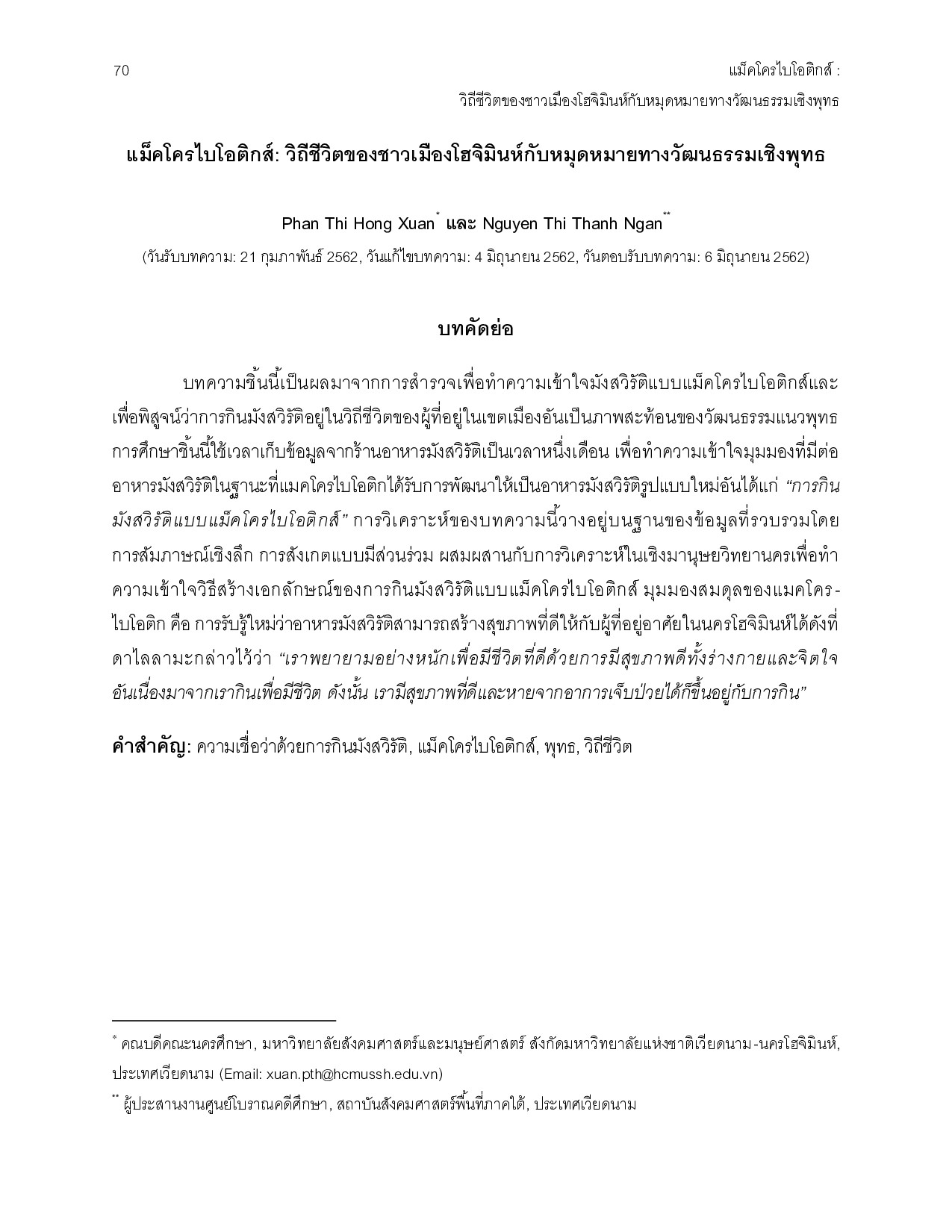Macrobiotic: A Way of Life of Ho Chi Minh City's Urban People with the Mark of Buddhist Culture
Keywords:
Vegetarianism, Macrobiotic, Buddhist, Way of LifeAbstract
This paper presents the results of a survey aiming to understand macrobiotic vegetarianism and to prove that vegetarianism is an urban residents’ way of living representing the Mahayana Buddhism’s culture. The research took a month in collecting data from the vegetarian restaurants to understand vegetarian's perceptions toward macrobiotic vegetarian as macrobiotics has been developed to a new model of vegetarian. The analysis of this article base on the data gathered from in-depth interviews, participant observation, combined with the analysis of urban anthropology to make clear about how the ‘macrobiotic-vegetarian’ create their identity. The perspective of balanced macrobiotic is a new perception that vegetarian can bring healthy life for urban residents in Ho Chi Minh City and as the Dalai Lama said: "We strive to live best by staying healthy, our physical and mental joy. Because we eat to live, how healthy we live and how well we recover from illness depends on eating.”
References
Briscoe, D. (2016). Macrobiotic Self-healing theory, Macrobiotic America. California: n.p.
Greger, M. (2018). How Not to Die Cookbook: 100+ Recipes to Help Prevent and Reverse Disease. Ho Chi Minh City: Young Publishing House.
Hien, V. (2018). Am thuc chay trong Phat giao Bac Tong (In Vietnamese). [Vegetarian Foods in Mahayana Buddhism] in Bao Moi [Bao Moi Newspaper]. Retrieved January 27, 2019, from https://baomoi.com/am-thuc-chay-trong-phat-giao-bac-tong/c/25987587.epi
Ion, R. A. (2007). “Reasons Why People Turn To Vegetarian Diet.” Economics of Agriculture, 54 (3): 353-358.
Kushi, M. & Oredson, O. (1989). Macrobiotic Palm Healing: Energy at Your Finger-Tips. New York: Japan Publication.
Leahy, E. & Lyons S. & Tola, R. S. J. (2010). An Estimate of the Number of Vegetarians in the World. Working Paper No. 340. Retrieved January 19, 2019, from https://www.researchgate.net/publication/254412281_An_Estimate_of_the_Number_of_Vegetarians_in_the_World
Lien, P. L. (2015). Vietnamese Language: Common Vietnamese Dictionary. Hanoi: Hong Duc Publishing House.
Ly, N. (n.d.). An chay thuc duong: Giai phap cho khoe manh & hanh phuc (In Vietnamese). [Macrobiotic Vegetarianism: Dietary Adjustments for Healthy and Happy Life]. Retrieved January 19, 2019, from https://gaolut.vn/nguyen-ly/an-chay-thuc-duong-giai-phap-cho-khoe-manh-hanh-phuc-1122.html
Otani, Y. (2015). “Creating a New Vegan Diet Culture Through The Restoration of Washoku (Japanese Cuisine): A Proposal for ‘The Balance Sheet of Food and Life” based on Yin-Yang theory.” Vegetarian Research, 16: 1-12.
Palaniswamy, U. R., (2003). “Vegetarianism and Human Health.” HorlTechnology, 13 (2): 243-251.
Sen, T. V. H. (2019). An chay. (In Vietnamese) [Vegetarian] Retrieved January 27, 2019, from https://thuvienhoasen.org/tudien?k=%C4%83n%20chay
The Kushi Institute of Europe. (n.d.). What is Macrobiotic?. Retrieved January 19, 2019, from https://www.macrobiotics.nl/library/macrobiotics1.html.
Thien, S. T. (2017). 6 Mon an chay theo phuong phap thuc duong Ohsawa don gian ngon mieng (In Vietnamese). [6 Easy and Tasty Vegetarian Dishes Inspired by Ohsawa's Macrobiotic Recipes]. Retrieved January 19, 2019, from http://shopthuanthien.com/blog-chia-se/kien-thuc-ve-thuc-duong/6-mon-an-chay-theo-phuong-phap-thuc-duong-ohsawa-don-gian-ngon-mieng.html.
Wherley, J. M. (2002). "An Existential Examination of Macrobiotic Theory" From University of Tennessee Honors Thesis Projects website, Retrieved January 27, 2019, from https://trace.tennessee.edu/cgi/viewcontent.cgi?article=1612&context=utk_chanhonoproj.






